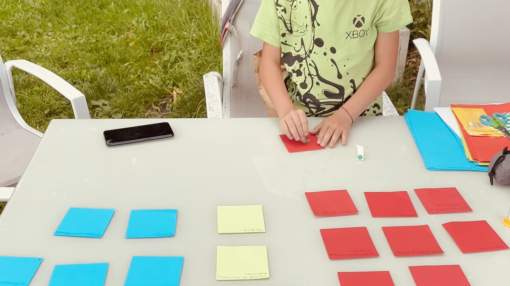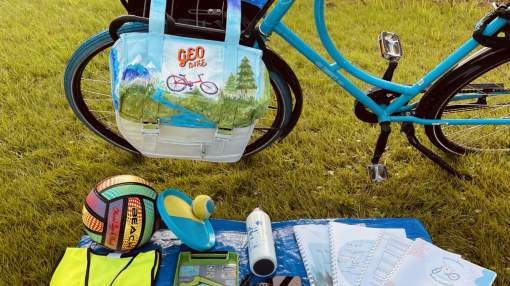Expertise
Social Sciences
- Citizen
- Science
- Research
- Project
- Conceptualization
Earth and Planetary Sciences
- Netherlands
- Ukraine
- Investigation
Organisations
- Faculty of Geo-Information Science and Earth Observation (ITC)
- Temporary (ITC-TEMP)
- ITC Staff (ITC-TEMP-STAFF)
- Services ITC (ITC-SERVICES)
- Faculty buro (ITC-SERVICES-FB)
- Digital Society Institute
Publications
2025
2024
2023
2022
Research profiles
Current projects

Enhancing citizen science with youth through co-creation, technology and design thinking
Embedded in the series of geographic citizen science projects where temporarily displaced youth explores their new environments (Water Rangers Twente, 2022; Map4Rec, 2023), this project seeks to deepen the impact of citizen science with youth. The project includes exploratory activities of two types: co-creation workshops (aimed at advancing methods for playful co-creation of future projects) and educational micro-modules (aimed at developing and evaluating educational materials on several cross-cutting subjects such as geospatial technology, design thinking, and sustainability). The final goal of the project is to enrich citizen science with youth, while increasing and diversifying its impact. This project is funded by the DesignLab Research Fellows Fund.

Mapping informal sports and recreation opportunities with refugee youth (Map4Rec)
Creating informal sports and recreation opportunities is crucial for the well-being of youth. Yet there are multiple barriers to the equal presence in outdoor activity landscapes, such as accessibility and inclusion. For temporarily displaced youth, additional barriers relate to the inability to explore their new environments without the supervision of adults, and to the lack of knowledge of accepted social behavior and affordances offered by public spaces. In this project, we introduce youth from Ukraine temporarily residing in refugee facilities in Twente to citizen science and engage them in the active exploration and mapping of informal places for sports and recreation. During the summer vacations (August 2023), participants will explore their new environments through bicycle field trips, collecting data — through observation, but also sensors — on places for outdoor activities. In October, they will learn to analyse and visualise collected data using geospatial tools. Apart from providing space for the restoration of basic needs such as sociality and safety (which are known to contribute to well-being) the project will introduce participants to the exciting world of geospatial data and tools in a youth-friendly way. This project is funded by IMPETUS, and the team that I am leading as the project PI includes Javier Martinez (ITC, UT) and Kateryna Miller (an external stakeholder).
GEO CS and Pre-University: building a bridge between school education and digital technology for geo citizen science
Digital tools are essential in geosciences. ITC’s state-of-the-art Geospatial Computing Platform provides such tools for research and education purposes. Many of the provided tools are also useful for citizen science (CS) projects and ITC can significantly facilitate such activities through the platform. However, the threshold to start using them is currently high and any serious attempt to support CS requires a well-designed approach with training targeting citizen scientists. This includes primary and secondary school students, whose curricula pay special attention on digital technology and promote involvement to CS activities. This project focuses on this group and aims to find out how pre-university students and teachers can be supported to use a modern digital geoscience toolbox for CS projects. In cooperation with UT Pre‑U, a feasibility study will be performed to identify how the platform and available tools can be used for CS activities, including blitz campaigns. Potential use cases and expected impacts will be documented. Finally, a roadmap for developing well-written training material for the target audience will be prepared in consultation with teachers. This project is conducted in collaboration with Serkan Girgin (project PI) and Jan Jaap Wietsma, and has been funded by the Geographic Citizen Science Seed Fund.
In the press
- First Unconference "Children, Nature and Cities", an article in Hallo Almelo, 6/11/2024
- Video Story of the "Mapping for Recreation (Map4Rec)" project on YouTube, 01/01/2024
- Children from Ukraine have a busy summer doing research with UT, an article in Tubantia on the "Mapping for Recreation (Map4Rec)" project, 23/11/23
- Citizen science with temporarily displaced youth, an interview to Natuur en Milieu based on the "Water Rangers Twente" project, 30/09/22
- Citizen Science, an interview to IP vakblad voor de informationprofessional, with Wieteke Willemen and Nina Schwarz, 27/06/22
News on utwente.nl
- Case study: Geographic Citizen Science, an interview to the Citizen Science Hub Twente sharing the history and current stance of Geographic Citizen Science at ITC, 9/01/22
Address

University of Twente
Langezijds (building no. 19), room 1233
Hallenweg 8
7522 NH Enschede
Netherlands
University of Twente
Langezijds 1233
P.O. Box 217
7500 AE Enschede
Netherlands
Organisations
- Faculty of Geo-Information Science and Earth Observation (ITC)
- Temporary (ITC-TEMP)
- ITC Staff (ITC-TEMP-STAFF)
- Services ITC (ITC-SERVICES)
- Faculty buro (ITC-SERVICES-FB)
- Digital Society Institute